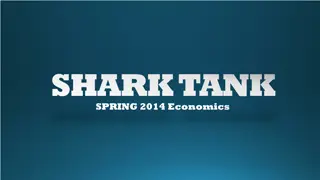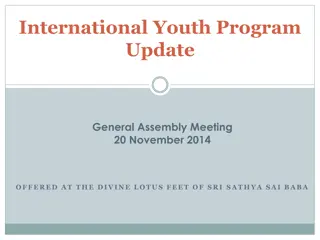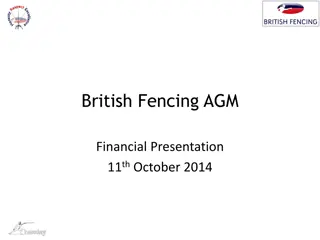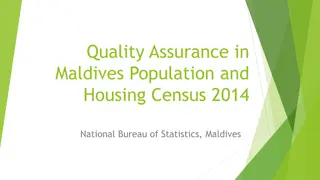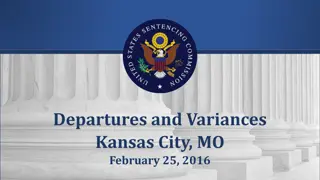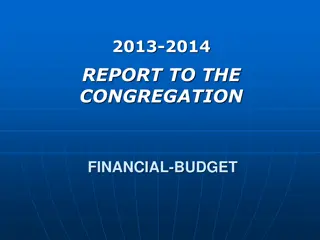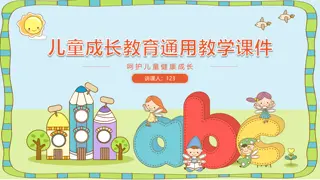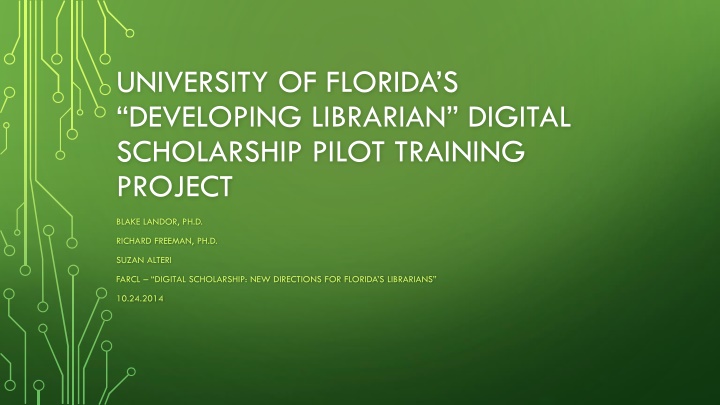
Digital Humanities Initiatives at University of Florida
Explore the digital humanities initiatives at the University of Florida, including the development of librarian training projects, collaborations, and discussions on digital humanities concepts. This project focuses on enhancing the library's infrastructure to support digital scholarship and offers training sessions for subject librarians to become digital humanities practitioners and consultants.
Download Presentation

Please find below an Image/Link to download the presentation.
The content on the website is provided AS IS for your information and personal use only. It may not be sold, licensed, or shared on other websites without obtaining consent from the author. If you encounter any issues during the download, it is possible that the publisher has removed the file from their server.
You are allowed to download the files provided on this website for personal or commercial use, subject to the condition that they are used lawfully. All files are the property of their respective owners.
The content on the website is provided AS IS for your information and personal use only. It may not be sold, licensed, or shared on other websites without obtaining consent from the author.
E N D
Presentation Transcript
UNIVERSITY OF FLORIDAS DEVELOPING LIBRARIAN DIGITAL SCHOLARSHIP PILOT TRAINING PROJECT BLAKE LANDOR, PH.D. RICHARD FREEMAN, PH.D. SUZAN ALTERI FARCL DIGITAL SCHOLARSHIP: NEW DIRECTIONS FOR FLORIDA S LIBRARIANS 10.24.2014
UNIVERSITY OF FLORIDAS DEVELOPING LIBRARIAN DIGITAL SCHOLARSHIP TRAINING PROJECT PRESENTATION FOR FACRL, OCT. 24, 2014 BLAKE LANDOR, PH.D., CLASSICS, PHILOSOPHY, RELIGION LIBRARIAN/CHAIR AND CO-COORDINATOR OF THE DIGITAL HUMANITIES LIBRARY GROUP, GEORGE A. SMATHERS LIBRARIES, UNIVERSITY OF FLORIDA
Digital Humanities at UF UF Libraries Digital Infrastructure UF Libraries Digital Infrastructure UF Libraries Digital Infrastructure UF Libraries Digital Infrastructure UF Libraries Digital Infrastructure UF Libraries Digital Infrastructure UF Digital Humanities Projects UF Digital Humanities Projects Graduate courses in DH UF Digital Humanities Projects UF Digital Humanities Projects DH-related activities at UF UF s Digital Humanities Working Group (DHWG) UF s Digital Humanities Working Group (DHWG) UF Digital Humanities Library Group (DHLG) UF s Digital Humanities Working Group (DHWG) UF s Digital Humanities Working Group (DHWG) UF s Digital Humanities Working Group (DHWG) UF s Digital Humanities Working Group (DHWG) Scott Nygren Scholars Studio (Library West)
DIGITAL HUMANITIES LIBRARY GROUP (DHLG) (JANUARY, 2014-) History and Description: Co-coordinated by Blake Landor and Laurie Taylor an offshoot of the Data Management/Curation Task Force (DMCTF) began as a volunteer library interest group for the discussion of digital humanities issues and the planning of training sessions includes subject librarians and other library personnel interested in Digital Humanities (about 16 altogether) has affinities to, and collaborates with, the campus-wide Digital Humanities Working Group (DHWG) Purpose: the discussion of issues and concepts in Digital Humanities as applied to libraries the training of subject librarians to serve as Digital Humanities practitioners and consultants, thus expanding the library s infrastructure in support of Digital Humanities the development of Digital Humanities collaborations both within the Libraries and across campus
TRAINING (AUGUST, 2014-JULY, 2015) Purpose: to develop Digital Humanities skill sets including Project design and project charters Project management skills and concepts Online portfolio development Professional blogging Text Encoding Initiative (TEI) markup Online exhibit design Metadata and linked data Spatial Information Services (GIS) Data mining/visualization
DEVELOPING LIBRARIAN PROGRAM@COLUMBIA U After several weeks of discussion, participants in DHLG decided to model their training sessions on the Developing Librarian Program at Columbia University, and applied for a mini-grant to do so. The [Developing Librarian] program is based on the assumption that learning must happen in context ; therefore the training is project-based with all participants engaged in creating a digital humanities research project as a team. the Developing Librarian Program web page (http://www.developinglibrarian.org/about/)
MINI-GRANT PROPOSAL $5,000 for one year (July 1st, 2014-June 30,2015) Supports 3 external trainers and 1 OPS worker The project team, consisting of 16 members, commits 6% of their FTE to cost sharing. The project involves using DH techniques to curate the Grimm Brothers sub-collection of the online Baldwin Library of Historical Children s Literature
ASSESSMENT Judith Roberts, Instruction Consultant/Training Program Coordinator, is doing the assessment as part of her EdD. program at UCF. Gathers data to assess the effectiveness of the training over 11 months starting August, 2014. Pre and post assessments are taken of participants comfort level with the material. Results of the study are being submitted to the IRB.
SCOTT NYGREN SCHOLARS STUDIO (NOV. 2014-) The seed for this was planted in March when an article on Brown University s new scholars lab and collaborative DH undergraduate course was shared with the DHLG. Dean Judy Russell inquired what it would take to establish a lab like that at UF. A task force from DHLG met over several weeks to work up a proposal. The studio was supported with end of year funding plus some extra money from one of the endowment funds.
LESSONS LEARNED (TO DATE) In terms of building Digital Humanities infrastructure, a just in case approach may be overtaken by just in time . Having a well-defined framework for DH collaborations is essential. Getting buy-in from the administration, and keeping them informed, may have unexpected benefits. Learning digital humanities skills works best when there is a specific project which a group of co-learners is working on.
CONTACT INFORMATION: Blake Landor/UF Digital Humanities Library Group George A. Smathers Libraries, Library West (352) 273-2644 landor@ufl.edu
THE BALDWIN LIBRARY AND THE DEVELOPING LIBRARIAN PROJECT SUZAN ALTERI CURATOR, BALDWIN LIBRARY OF HISTORICAL CHILDREN S LITERATURE FLORIDA ACRL 10.24.2014
BALDWIN LIBRARY OF HISTORICAL CHILDRENS LITERATURE 110,000+ book collection ranging from the 1660 s to present day Majority of material is from the late 18th century and 19th century Collection development process has been revisited three times Robust digital collection of full-text materials www.ufdc.ufl.edu/juv
INVOLVEMENT OF THE BALDWIN LIBRARY IN PROJECT Initial discussions of the Digital Humanities Library Group (DHLG) Moving to a project-based format Discussion of different ideas and collections Democratic values of project Grimm Fairy Tales sub-collection: http://www.ufdc.ufl.edu/grimm
PARTICIPANT ROLE IN DEVELOPING PROJECT Began participation from the first call Blake sent out Involved in most meetings and discussions Voted on project selection Participate in workshops and speakers as schedule allows Attended Project Charter workshops
CURATOR ROLE IN DEVELOPMENT OF PROJECT Identify before grant was written what I would like done with the sub- collection, both in grandiose terms and in actual deliverables Determine what I felt was most important for the digital collection as it currently stands and what was important for the public, scholars, and the Baldwin Library What did I, as a curator, want to learn from this experience that I could apply to my work
THE PROJECT CHARTER AS A CURATOR Very difficult process as a curator Hey! It s my collection, what are you doing?!? Disagreements over how certain aspects of the project would be completed
THE PROJECT CHARTER AS A PARTICIPANT Still a difficult process Often unable to look at the Project Charter as a participant only Are we taking on too much? What do I want to learn?
EXPECTATIONS OF THE PROJECT AS CURATOR Online exhibit with data visualization (like a map) TEI Inject fresh content into the online exhibit Involved in discussions of every aspect of the project (at least in beginning) Less concerned with the finished product than with learning
FUTURE IDEAS THAT HAVE COME OUT OF DISCUSSION AND TRAINING Creation of OAFS Open Access Folklore Series Need for even more training to leverage the full capabilities of having full- text materials How can scholars be involved in marking up text? What types of data mining can be done with the Digital Collection?
Richard Freeman, UF Anthropology Librarian FACRL Conference UCF, Orlando, Fla October 24, 2014
DEVELOPING LIBRARIAN DIGITAL SCHOLARSHIP PILOT TRAINING PROJECT
It is good to have an end to journey toward; but it is the journey that matters, in the end. Ursula K. Le Guin
DEVELOPING LIBRARIAN DIGITAL SCHOLARSHIP PILOT TRAINING PROJECT PART I
From August 12, 2014 till today: 13 Workshops Topics ranged from digital curation to blogging to software training.
Goal? For each of us to have a kind of digital Knowledge toolbox.
The Digital Humanities Library Group (DHLG) Project Charter
Why projects go bad *Unclear Goals
Why projects go bad *Unclear Goals *Disagreement about goals
Why projects go bad *Unclear Goals *Disagreement about goals *Scope is unconstrained
Why projects go bad *Unclear Goals *Disagreement about goals *Scope is unconstrained *Disagreement on roles
Why projects go bad *Unclear Goals *Disagreement about goals *Scope is unconstrained *Disagreement on roles *Inadequate resources
Why projects go bad *Unclear Goals *Disagreement about goals *Scope is unconstrained *Disagreement on roles *Inadequate resources *Disagreements/resentments/burn out
Why a Charter? To clearly state the project s scope, objectives, methods, participants roles & responsibilities, and clearly identify our stakeholders
DEVELOPING LIBRARIAN DIGITAL SCHOLARSHIP PILOT TRAINING PROJECT PART II (Hopefully in the simple past tense - pret rito)
BIBLIOGRAPHY Auckland, Mary. Re-Skilling for Research: An Investigation into the Role and Skills of Subject and Liaison Librarians Required to Effectively Support the Evolving Information Needs of Researchers. London, England: Research Libraries UK, 2012, 2012 2012. http://www.voced.edu.au/content/ngv50773. Borovsky, Zoe. Libraries and Digital Humanities - Google Drive. Accessed February 9, 2014. https://docs.google.com/document/d/1c3e01BED2B2_YJlPHYl9pL4EiDQJfSjETtT9CoMdpv4/edit?pli=1. Maron, Nancy L., and Pickle, Sarah. Sustaining the Digital Humanities: Host Institution Support Beyond the Start-Up Phase. Accessed October 19, 2014. http://www.sr.ithaka.org/research-publications/sustaining-digital-humanities. Mu oz, Trevor. Digital Humanities in the Library Isn t a Service. GitHub Gists. Accessed February 7, 2014. https://gist.github.com//trevormunoz/3415438 Posner, Miriam. No Half Measures: Overcoming Common Challenges to Doing Digital Humanities in the Library. Journal of Library Administration 53, no. 1 (2013): 43 52. doi:10.1080/01930826.2013.756694. Svensson, Patrik. The Landscape of Digital Humanities 4, no. 1 (2010). http://www.digitalhumanities.org/dhq/vol/4/1/000080/000080.html. Taylor, Laurie N., and Landor, Blake. Intertwingularity with Digital Humanities at the University of Florida. Dh Lib, July 23, 2014. http://acrl.ala.org/dh/2014/07/23/intertwingularity-digital-humanities-university-florida/. Vinopal, Jennifer, and Monica McCormick. Supporting Digital Scholarship in Research Libraries: Scalability and Sustainability. Journal of Library Administration 53, no. 1 (2013): 27 42. doi:10.1080/01930826.2013.756689.
QUESTIONS? BLAKE LANDOR, PH.D., BLALAND@UFLIB.UFL.EDU SUZAN ALTERI, SALTERI@UFL.EDU RICHARD FREEMAN, RICHARDFREEMAN@UFL.EDU











